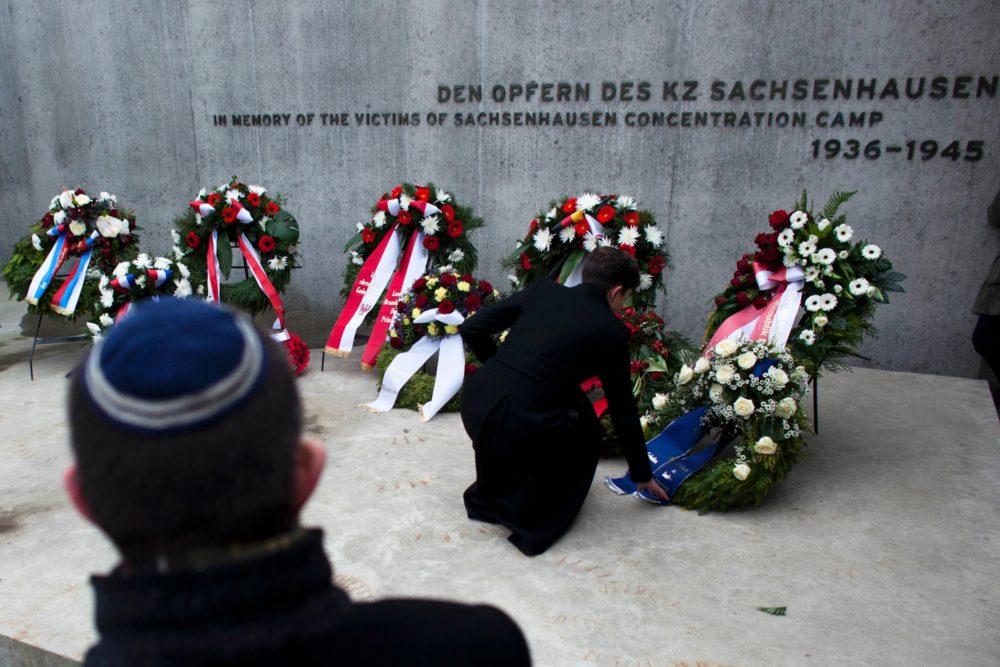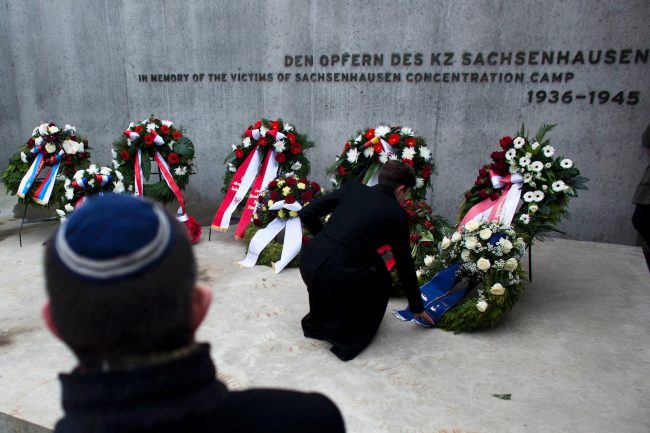
A man wearing a Kippah attends a wreath laying ceremony at the Station Z remembrance site at the Sachsenhausen Nazi death camp on the International Holocaust remembrance day in Oranienburg, Germany. (Associated Press)
Students and academics alike bustled into Hughes-Trigg Student Center to observe International Holocaust Remembrance Day Friday. The SMU office of the Chaplain, Hillel of Dallas and the Embrey Human Rights Program sponsored the event.
In a room seasoned with artwork both educational and evocative of concentration camps, the audience sat in deliberate attention waiting for the ceremony to commence, catalyzed with a prayer led by Dr. Judy Henneberger, associate chaplain and minister at SMU.
Afterwards, a Yahrzeit candle, present at synagogues to commemorate the dead, was lit in respect for those lost in the concentration camps, while Serge Frolov, associate professor of religious studies, and Nate and Ann Levine, chair of Jewish studies at SMU, recited Kaddish Yehe Shelama Rabba.
“It’s a traditional Jewish prayer recited for the deceased that is a part of every synagogue service,” Frolov said. “Traditionally, it was the duty of the firstborn son to recite it for the father, which is why it is usually translated as the Orphan’s Kaddish, but it literally means the Mourner’s Kaddish.”
Dr. Rick Halperin, director of SMU’s Embrey Human Rights Program, also spoke at the event, touching on the cold methods the Nazis employed to nearly exterminate the entire Jewish population.
Halperin said it is important to remember the Holocaust as a reminder that humanity can sink into the darkest of depths. He closed with a reading of an inscription from the memorial garden of Jewish children claimed by the concentration camps.
“They were Jewish children, 20 of them to be precise, taken out of the Neuengamme concentration camp and hanged as a gift to Adolf Hitler on his birthday, April 20, 1945,” Halperin said. “Four of the doctors that had been assigned to treat them in the camp, all of them French, were hanged on meat hooks along with the children at the basement of a school.”
After the ceremony, audience members were invited to collect bracelets inscribed with the mantra “There is no such thing as a lesser person.” Audience members could also purchase”Journey of Remembrance: a Christmas in the Death Camps of Poland,” a book of reflections and photographs collected and compiled during a Polish voyage led by Halperin and Sherry Aikman, coordinator of Embrey Human Rights Program, in 2002.
The Holocaust remembrance ceremony, the sixth of its kind to be held at SMU since 2006, testifies to the sobering magnitude of its namesake.
“I think Holocaust education in particular should be mandatory for young people all over the world, not just in the United States,” Halperin said. “[It’s important to] remember what happened and to bring the horrors of terrible human behavior to people, to show them what can happen when people are indifferent to cruelty and killing, that the Holocaust has lessons for everyone. [The crime] happened between 1933 and 1945, but the lessons live on today.”
In addition to the yearly ceremony, SMU has been organizing tours to Poland since 1996. The trip offers a critical insight to the torment and fear various innocents suffered on an hourly basis.
“The big thing that it did for me was that — I study human rights for a living, and I think in terms of numbers, but upon arriving in Poland, it became about an individual, personal stories, and it’s harder to step away from the tragedy,” Jacqueline Demeritt, assistant professor of political science at UNT, said. “I had family in the Holocaust, and heading to Poland was like ripping off all my calluses.”
The tour, led by Halperin, will take place after fall semester ends, Dec. 18 to Dec. 30.
“This is my fifth trip. I’ve been going since 2002,” Aikman said. “Each trip is very unique, the people, the weather, the changing of the sites, which are always involving. There is now a trend to feature more literature at the sites in English. We have an itinerary, and students are able to meet with survivors and ask questions. It’s very moving.”









